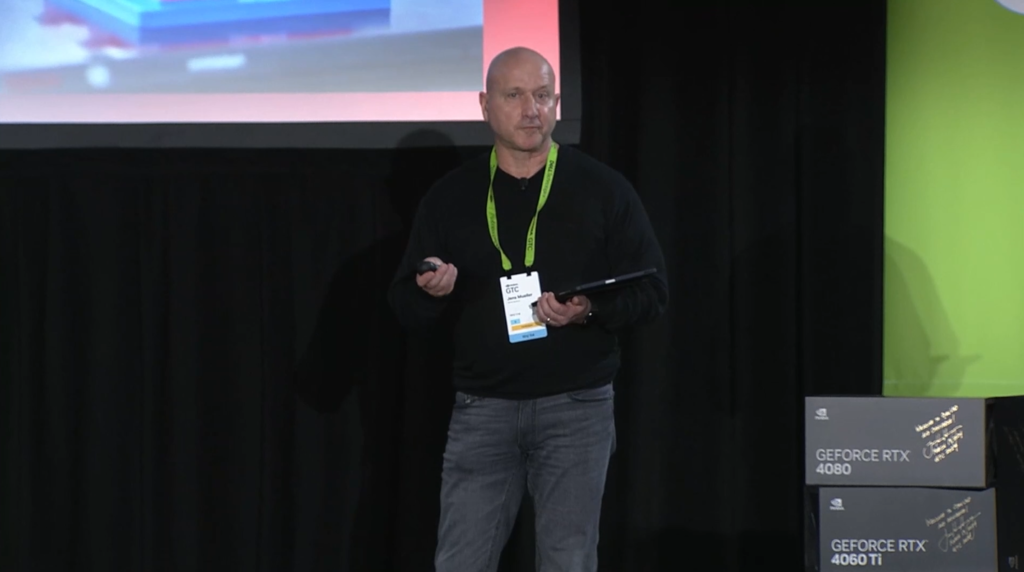Apr 23, 2024
GTC Wrap-Up: A Look into the Future of AI in Industry
Jens Mueller, CEO of Ascon Systems, in March 2024 attended NVIDIA GTC , the most important developer conference of the year. Participating at the event in California as a NVIDIA partner , he presented on “Enabling production of the future with OpenUSD and GenAI.” He also engaged in discussions to discover key topics that are likely to impact our work in the future. Three trends in particular stood out to him. They’re already shaping conversations and starting to be implemented in the first environments.

An overview of the trends:
- The most important trend: the emergence of AI factories
- The growing significance of results-oriented AI
- The advantages of turnkey AI
The emergence of AI factories
Jens Mueller: “The era of AI factories has begun. Until now, my impression had been that this development would take place in a gradual, linear fashion, and that it would still take some time. GTC changed that. Some companies are already integrating AI on a large scale, skipping stages which, in other places, still need to be achieved by implementing flexible, automated production.
The advantages are obvious. AI factories are facilities in which AI systems collaborate with each other. They handle complex tasks in the areas of planning and automated production. Humans and AI work together here. This concept is similar to the scenario that we are currently discussing for Industry 5.0. At GTC, it became clear that many manufacturers are already living this. They are creating high-precision digital twins, also by using the NVIDIA Omniverse. In doing so, they are building the foundation for AI factories and enabling a new level of automation and orchestration of manufacturing activities.
Data is what gets things moving, everything depends on data availability. This means a paradigm shift for factory planning and for work environments. Because smart factories need hyperconvergent IT/OT infrastructures and consistent data strategies, which have an impact across the whole enterprise. That means we need to start creating the conditions now so that we can truly benefit from the efficiency of AI factories in the near future. This includes widescale implementation of the Industrial Internet of Things, the standardized use of digital twins, less work handling execution on the shop floor, more collaboration across locations and facilities, virtualization and visualization of results, and analytics insights from digital twins.”
The growing significance of results-oriented AI
Jens Mueller: “The true value of generative AI lies not in its status as a technological marvel or all the possibilities it opens up. Instead, it’s how it can be applied to solve problems in the real world. By focusing on concrete results, the development of AI technologies can be geared towards solving practical problems. In turn, the AI generates value. For example, in the automotive industry, AI is increasing process efficiency, for instance through RFP automation. Or when the quantitative KPIs for measuring the success of AI such as speed and other technical performance indicators are joined by qualitative evaluation criteria. How much did AI help solve a problem, how well did it help achieve objectives? AI allows us to ask more complex questions. This is particularly important because more and more factors are being incorporated into production planning, such as resources and procurement, compliance, climate protection, and so on. Here, the AI can think ahead and formulate scenarios from the data it receives faster than humans currently can. Humans, in turn, can ask the perfect question to arrive at a result.”
The advantages of turnkey AI
Jens Mueller: “GTC 2024 highlighted the growing importance of turnkey AI solutions and AI-as-a-Service. Turnkey AI resolves many challenges. It can be implemented quickly, it’s immediately useful, and it reduces costs. And above all, companies don’t need IT experts to use it. This is because updates, support, and maintenance are usually taken care of by the AI provider. Nothing needs to be reconfigured or reprogrammed. This approach fulfills the need in many industries for scalable, easy-to-integrate AI solutions that can optimize operations through improved data accuracy, engagement, and reduced downtime.”
The world's largest developer conference GTC
San Jose, California, USA in March 2024: GTC 2024 is entitled "The Conference for the Era of AI". More than 12,000 visitors are present on-site, and tens of thousands more have tuned in online to watch the keynote by NVIDIA CEO Jason Huang and the many panels.
Our contribution at GTC shows how Ascon Qube is applied in practice and is developing the factory of the future. IT and OT are unified, data flows seamlessly between levels, and digital twins control manufacturing processes in real time.


